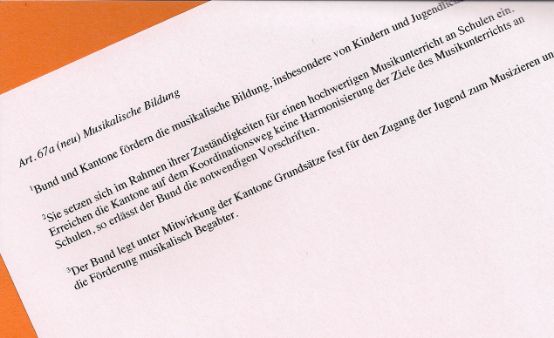PGM: 72.8% Yes! And what happens now?
At the meeting of the Parliamentary Group on Music on December 6 in Bern, the focus was on the implementation of the constitutional article on the promotion of music. There were considerable differences of opinion between the EDK and the music associations.

On September 23 last year, the constitutional article on the promotion of music was adopted by a record-breaking margin. Around three quarters of voters agreed, signaling that something needed to be done in this area. How will the mandate now be implemented? The Confederation is responsible for the third paragraph of the new constitutional article, which concerns the promotion of music outside schools. Federal Councillor Berset immediately convened a working group to draw up proposals. At the meeting of the Parliamentary Group on Music (PGM), chaired by Christine Egerszegi, member of the Council of States (who unfortunately had to excuse all her fellow councillors), the main topic was the promotion of music in schools. Susanne Hardmeier, Deputy Secretary General of the Swiss Conference of Cantonal Ministers of Education (EDK), was invited to describe the implementation from the EDK's perspective.
From "running" to disaster
In her presentation, she outlined the responsibilities of the Confederation, cantons and communes in the implementation of the constitutional article. With regard to the implementation of paragraph 2 on music lessons in schools, she referred to the work already underway in the language regions to harmonize curricula (Curriculum 21). Although she emphasized that the extremely high proportion of "yes" votes carried great weight for the respective working groups, she failed to provide a concrete answer as to how the concerns of the constitutional article would now be incorporated.
The association representatives present, first and foremost from the Swiss School Music Association (VSSM), were anything but satisfied with this. They emphasized how dramatically bad the situation was for music in public schools in many places, how time was of the essence and that, at the latest since the vote, it was no longer acceptable to consider this issue as being taken into account in the current processes. They also called for a nationwide working group on this issue so that the specific problems of the lack of teachers, the recognition of diplomas and the saving of lessons could be addressed with the necessary emphasis. The harmonized curricula are mere "stars in the sky" before 2018, but immediate measures are needed. Hardmeier described such a "parallel structure" as pointless.
Between the extremes
Both Jean-Frédéric Jauslin, Director of the Federal Office of Culture (FOC), and Beat Zemp from the Swiss Teachers' Association (LCH) took a position between the extremes. Jauslin pointed out that the vote was only two months ago and that the cantons had to be given time to implement the funding mandate. However, after a certain period of time, which has yet to be defined, the BAK would then be required to review the measures taken by the cantons and, if necessary, demand further measures. Zemp agreed with the EDK's approach in principle, but also pointed out that school music was in a real mess. He proposed a nationwide monitoring process to ascertain the situation in the individual cantons. And if necessary, such a survey could also be used to exert public pressure on the cantons in default.








